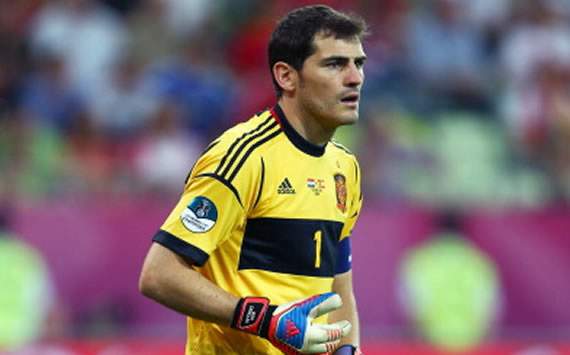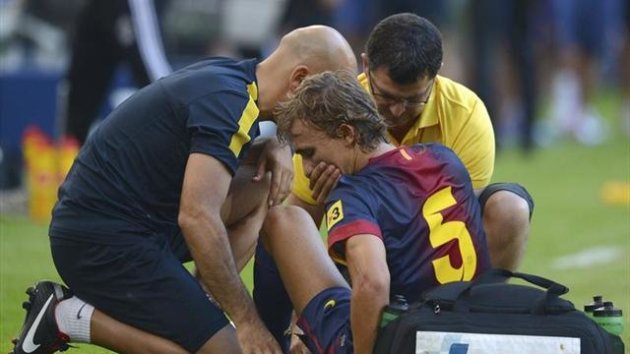 |
Spain's Cesc Fabregas celebrates after scoring the decisive penalty shootout during the Euro 2012 soccer championship semifinal match between Spain and Portugal in Donetsk, Ukraine, Thursday, June 28, 2012. (AP Photo/Jon Super)
|
 Glasgow, Scotland – Given what its national team has accomplished the past four years, Spain faces some obvious great expectations at the Summer Olympics.
Glasgow, Scotland – Given what its national team has accomplished the past four years, Spain faces some obvious great expectations at the Summer Olympics.La furia Roja have won two Euro titles (2008 and 2012), a World Cup (2010) and the UEFA Under-21 championship (2011).
So, is mining precious Olympic gold next?
The Spaniards start their quest for their second gold medal -- they won their first at the 1992 Barcelona Summer Games -- against Japan at Hampden Park in this Scottish city on Wednesday at 7 a.m. ET.
"The senior side has set the bar so high and, whether we like it or not, that puts the pressure on us," goalkeeper David de Gea told The Guardian. "It also motivates us, though. We want to try to emulate them. It won't be easy but we know that we have a good team."
Spain is stacked with players who have enjoyed success this year on the winning Euro side -- forward Juan Mata, Jordi Alba and Javi Martínez. This team also includes many players from that U-21 team that won the European title last year.
"We have played together for a long time," de Gea was quoted by The Guardian. "We know each other, how we play, how we work, and we get on well."
Those are words Spain's Group D competition -- Japan, Honduras and Morocco – do not want to hear.
Mata, incidentally, will be vying for his fourth major championship, already having won the UEFA Champions League crown and English Premier title with Chelsea and Euro 2012 with Spain's senior side. Adrian, a striker, was one of the key Atletico Madrid players on a team that defeated Athletic Bilboa in the Europa League final.
The men's tournament kicks off in four venues across Great Britain on Thursday, a day before Friday's opening ceremonies. The 16-team competition will commence with four groups. The top two teams in each group will qualify for the Aug. 4 quarterfinals, followed by the Aug. 7 semifinals and the Aug. 9 gold-medal match at Wembley Stadium.
In contrast to the women's tournament, which is an open competition, the men's event is restricted to Under-23 players. Teams, however, can a maximum of three overage players.
The groups:
Group A -- Great Britain, Senegal, United Arab Emirates
Group B -- Mexico, South Korea, Gabon, Switzerland
Group C -- Brazil, Egypt, Belarus, New Zealand
Group D -- Spain, Japan, Honduras, Morocco
Trying to predict the men's tournament is not an easy task because U-23 teams are temporary creations because they are age-related. Every four years teams are formed for one big competition and then disperse. The real wildcard can be the overage players, who if selected wisely by the coach, can make a vital impact. If not, they can turn into a disaster.
Contenders
After Spain, just who are the rest of the contenders?
Brazil -- The South Americans have won every major international soccer championship but an Olympic gold medal, coming tantalizingly close twice (1988 and 1996). Brazil has made winning the gold a priority, putting national team coach Mano Menezes, who will guide this side, under the gun. Brazilian coaches have been fired for falling short in previous Olympics. He will take a team that has been preparing for the 2014 World Cup. The
Dunga, the captain of the 1994 World Cup champions whose Brazilian side fell to eventual champion Argentina in the 2008 semifinals, likes the team's chances this time.
"Brazil has never had the appropriate preparation for an Olympic tournament before now," he said. "In the past, coaches had just days to prepare a team. This year I think Brazil's more prepared and the players that they've assembled are all the best in their individual teams. Neymar, Lucas and Damiao are really important players. Oscar, as well. They're doing great stuff not only in the domestic tournament, but also Copa Libertadores and even some European tournaments.
"They have to take advantage that Argentina isn't there. . . . There's a big opportunity for Brazil to win an Olympic medal."
Uruguay -- For the first time since 1928, the Uruguayans are back in the Olympics. They certainly have a legacy to live up to; having won the only two competitions they have appeared in (1924 and 1928). That led to the creation of the World Cup in 1930, which they won as well. This team has a decent shot at another medal, given the pedigree of their players, especially the over-age ones. Liverpool striker Luis Suarez, who was involved in that controversial handball that helped the South American side finish in third place, and Napoli forward Edinson Cavani must produce if they want a medal.
Mexico -- Like Spain, Mexico faces some great expectations. After all, El Tri's full team rules the CONCACAF roost after winning the past two Gold Cups (2009 and 2011), the FIFA U-17 championship in 2011 and finishing third in the FIFA U-20 tournament last year. And oh yes, the Mexicans won the CONCACAF Olympic qualifying tournament.
Giovanni dos Santos, who has struggled seeing playing time with Tottenham (England), but has shined on the Mexican national side, is expected to spark the attack. The key to Mexico's success will be its U-23 players that have seen action with the full National Team -- goalkeeper Jose Corona, defender Carlos Salcido and National Team striker Oribe Peralta.
"Why can't we dream of gold?" star striker Marco Fabian told World Soccer. "We have a great generation of players and we are peaking just at the right moment. The time has come for us to show what we are worth."
An interesting fact: no CONCACAF country has won a gold medal, although El Tri has come close, taking third place when they hosts the 1968 Summer Games in Mexico City.
Pretenders
These teams should reach the quarterfinals, but go no further.
Great Britain -- Even before the games began, the team was involved in controversy when David Beckham was left off the team. Manchester United midfielder Ryan Giggs, 38, who has never played in a World Cup for Wales, will try to lead a team that has not played many times together. It showed in a 2-0 loss to Brazil last week. That result did not leave Neymar impressed. "With them playing at home, I thought Team GB could be a potential threat to Brazil for the gold medal," he told reporters. "But after playing them, I am not so sure."
Switzerland -- The Swiss' chances was hurt by Basle, which refused to allowed any of its U-23 players to participate because it has to qualify for the UEFA Champions League. So coach Pierluigi Tami will rely on the likes of forward Admir Mehmedi, who scored his first international goal in a 5-3 victory over Germany and central defender Jonath Rossini, who plays for Sampdoria.
Belarus -- After qualifying for the Summer Games for the first time, Belarus might be in the right place at the right time in Group C. That group is dominated by Brazil, but is fairly weak with the likes of Egypt and New Zealand. Belarus, which finished third in the UEFA U-21 tournament, will be led by goalkeeper Alyaksandr Hutar and midfielder Dzmitry Baha.
Japan -- With several members of the team playing in Europe, the Japanese may be poised for some success at the Summer Games. Maya Yoshida is expected to lead the defense and Hiroshi Kiyotake to provide the goals.
Darkhorses
Senegal and Gabon -- Over the past two decades, African teams have been the surprises sides of the Olympic tournament, having brought home four medals (Ghana, gold, 1992), Nigeria (gold in 1996, silver in 2008) and Cameroon (gold in 2000). So, it would be unfair to ignore two of the teams, Senegal and Gabon. Senegal was the final team to qualify, needing to win a playoff game with Oman in England in April. An Olympic first-time, the Senegalese are paced by Cheikhou Koutate, who helped Anderlecht capture the Belgian crown last season, and Sadio Mane, who has tallied in World Cup qualifying. Another team making its Olympic debut, Gabon captured the African U-23 crown. Its strength appears to be in the midfield as Andre Poko scored the game-winner that boosted Gabon into the Summer Games, and captain Cedric Boussoughou.
New Zealand -- Overage players Ryan Nelsen, a former D.C. United defender and the captain of the Kiwis 2010 World Cup team in South Africa, and forward Shane Smeltz are among the team's key to success.
South Korea -- Every Korean player has extra motivation to win a medal because he will be able to forgo mandatory two-year military service. Coached by four-time world Cup participant Hong Mjung-bo, Korea lacks players who have had considerable amount of experience in European leagues and a weak attack, which could hurt the team.
Outsiders
Honduras -- The Central Americans have never won a medal in any sport in the Olympics, so just reaching the knockout will be considered an achievement. "We want to break this curse where some say we can't advance past the first round," goalkeeper Jose Mendoza was quoted by the Associated Press. "Our first objective is to qualify for the next round, so we can go for a medal." Coach Luis Fernando Suarez has experience guiding teams past the opening stage as he directed Ecuador into the Round of 16 at the 2006 World Cup. Two Major League Soccer players -- Sporting Kansas City midfielder Roger Espinoza, an overage player, and D.C. United midfielder Andy Najar will try to break that curse.
United Arab Emirates -- Having reached the Olympics for the first time, not much is expected of the UAE. The team has one thing going for it -- former UAE international Mahdi Ali, who has coached the players through various age groups. So, he knows their strengths and weaknesses.
Egypt -- With its National Team eliminated from the African Cup of Nations, Egypt will try to restore some international glory in Group C. The Egyptians, the first African team to perform in the Olympics in 1920, has been to the Summer Games 13 times.
Morocco -- The northern African team will try to beat the odds and reach the quarterfinals.
Read more: http://latino.foxnews.com/latino/sports/2012/07/25/olympic-preview-men-soccer/#ixzz21h9CbvT8
























